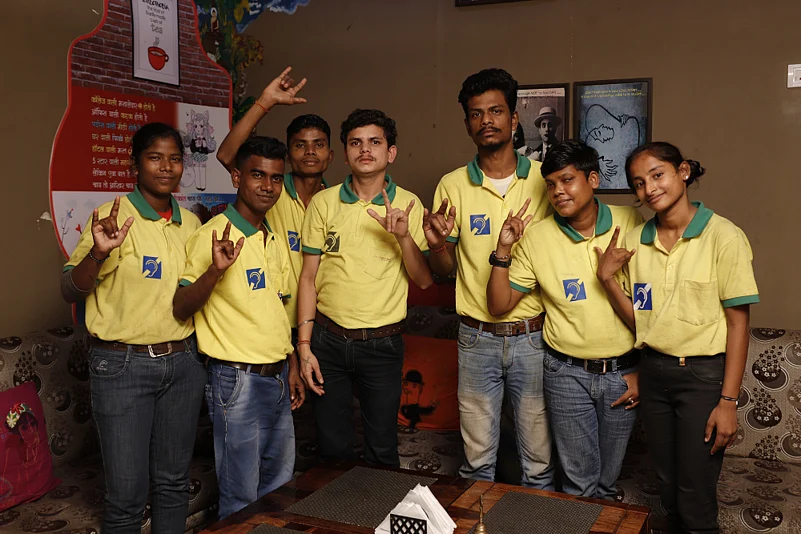Jamshedpur: Growing up as the only child with partial visual and intellectual disabilities in an orphanage, Nandita soon learned that she was not “suitable” for many jobs. She could not articulate her thoughts as clearly as the other kids. She had trouble following instructions and no matter how much she tried, she couldn’t wrap her head around math. While all others were able to get jobs and leave, she could not hold on to one despite her best efforts. “I knew I had to get a job because there is no food without money, and no one will feed me forever,” Nandita says.
Advertisement
It’s not that Nandita lacks skills. She likes to paint. She tells Outlook that she could also sew. And she could ride her cycle really fast. In 2011, she even won the gold medal for cycling at the Special Olympics World Summer Game. But none of these skills was enough to get her a job.
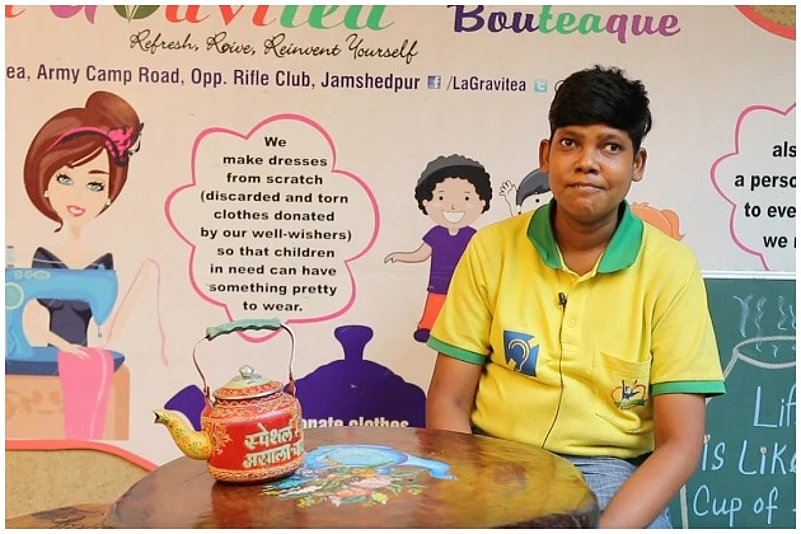
(Nandita narrates her story)
So, when she first heard about a cafe that was only run by persons with disabilities amid the Covid-19 pandemic, Nandita was curious. Called ‘La Gravitea’, the rather unusual tea parlour in Jamshedpur's Circuit House area is one of the few establishments in the country and the only one in Jharkhand that is run entirely by deaf and mute youth.
Advertisement
“I have been working here since 2020. It feels good to be among people who are facing the same kind of problems like me,” Nandita tells Outlook.
“For the first time in life, I found a family. I found work which was meaningful and I was paid for services that I had delivered,” Nandita says, tipping her ‘La Gravitea’ hat before she moves on with her work.
Brewed with love
La Gravitea was started in 2016 after its founder Avinash Duggar stumbled upon a sudden and vehement passion for tea. A former Vice President of sales at a steel plant in Jamshedpur, Duggar had spent 17 years in a corporate job that paid well but left little to the imagination. But he loved to travel and the job was good at paying the bills. On one of his trips, he entered a tea shop in England and fell in love.
“Tea is a wonderful thing. There are so many different varieties of tea with such fancy names and histories, so many different techniques to brew it, so many different ways to serve it. It fascinated me to no end,” Duggar says.
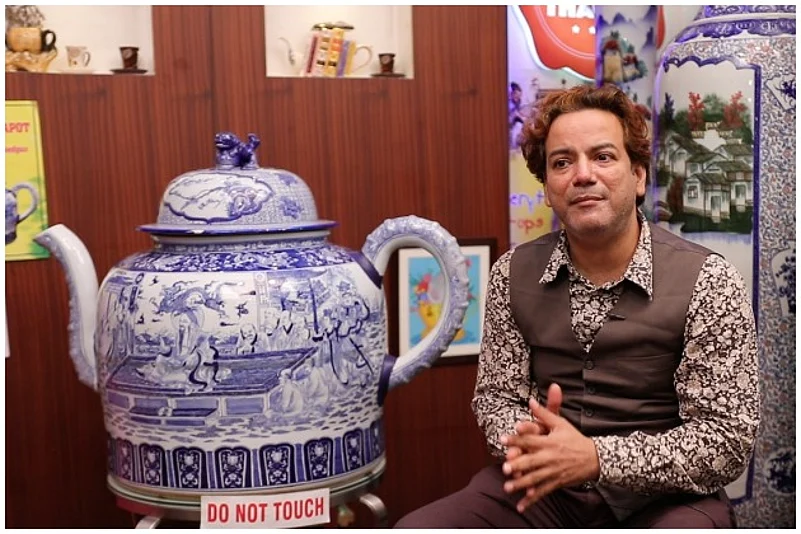
(Avinash Duggar inside La Gravitea in Jamshedpur beside what he claims is India's largest teapot)
Soon after that, Duggar decided to quit his job and enter the tea business for good. He set up a small cart and started selling tea. “One day, a little deaf girl and her brother came to me for tea. After drinking a few sips, the girl asked me if I could give her a job. I couldn’t do that because she was a minor. But it got me thinking,” he recalls.
Advertisement
Duggar’s wife Kajal says that it was as if he was consumed. “All he talked about was the little girl and how he couldn't help her”. That moment changed his life. Duggar started researching the education and employment opportunities for deaf-mute people and eventually reached out to local activists and ISL educators and institutions. Duggar found that despite graduating from special schools, many deaf people still did not get jobs. And a majority never even ended up in schools. “I wanted to do something for the young, unemployed deaf and mute youth. No one wanted to hire them, so I thought, why not hire them myself”.
Advertisement
That was how La Gravitea started. Today, the cafe employs 11 persons with hearing, learning or speech disabilities including seven deaf persons. Having first trained himself, Duggar personally trains them in Indian Sign Language (ISL) as well the vocational training required for running a cafe.
“We do everything on our own. We have complete freedom to work as we wish and refuse to do the jobs that we don’t like,” Sooraj Thakur, who has been working at the cafe for three years now, says in sign language. After losing four jobs as a carpenter and locksmith, this is Sooraj’s fifth job. Despite not knowing much about the cafe business, Sooraj decided to give it a try. He says he has not regretted it.
Advertisement
“In my previous jobs, they paid us less than hearing technicians and often insulted us with ignorant or impatient behaviour”. With his present job, Thakur can pay for his house rent, save for his sister’s wedding and contribute to monthly grocery shopping at home. He has also earned the moniker of ‘Chai King’ for his delicate yet flavourful tea brews.
Sooraj, however, notes that when it came to finding jobs, the deaf were on their own.
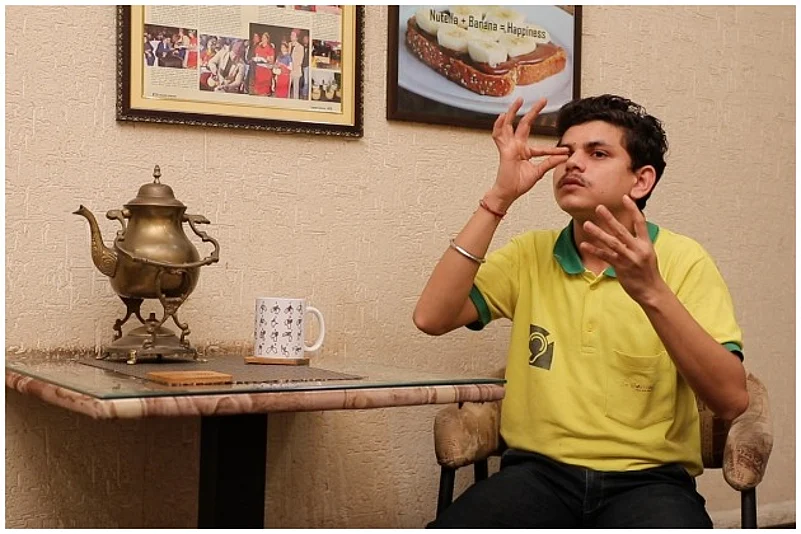
(Sooraj Thakur learnt ISL at school but he says schools for deaf children often fail to teach them any real vocational skills)
“The government does not do anything for us. There is a deaf club here. It’s full of youth with hearing impairments. They’re all just waiting. We have all our documents but no jobs, or stipend schemes come to us,” Sooraj signs. He adds that for someone like him, finding a source of livelihood was not easy, especially when no one spoke his language or wanted to teach him skills.
Advertisement
Discrimination begins early
The ignorance of the hearing community, says Pragya Singh, a certified ISL teacher trainer and principal of Jamshedpur’s DAV Public School, Bistupur, is one of the main obstacles for deaf people to get lasting employment. “The problem is not that they are not skilled or able. The problem is that the hearing community does little to understand or help them,” she says.
One day, in 2018, Singh visited La Gravitea and was impressed by the sign language menus and mugs that the cafe used as napkin holders to promote ISL. It gave her the idea to create an ISL wall in her school to promote and normalise the language among children. The wall was put up in 2019. Next, she plans to put these walls in all the classrooms across the school and turn it into a model for inclusion that schools in the rest of the country can follow. In her decade-long reign as the head of the school, Singh has also tried to incorporate several other strategies for inclusion in the way the school curriculum is designed and taught to students.
Advertisement
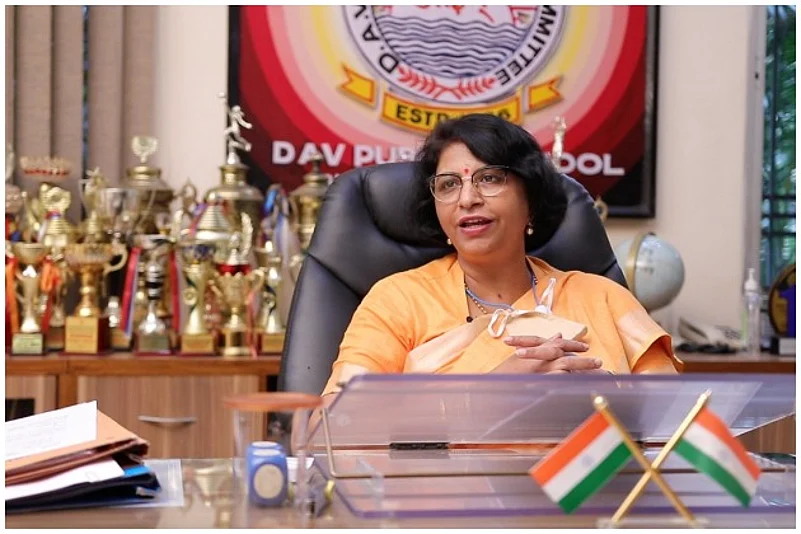
(DAV Public School, Bistupur, Jamshedpur principal Pragya Singh)
Two to five per cent of the students in each standard of DAV have some form of speech, hearing and learning disabilities including dyslexia and ADHD, Singh tells Outlook. “Being a little different doesn’t mean your child will not achieve. Achievement is not just in academics. If given the right care, everyone can achieve things in their own way," she adds.
For a majority of persons with disabilities in India, however, the picture is not as optimistic. According to a recent UN report, 75 per cent of children with disabilities do not attend any kind of school in India.
Advertisement
For those who can manage to go to school, lack of financial resources and acceptance at home, untrained teachers and lack of proper skill training programs often keep students from achieving optimum results. Take, for instance, the case of deaf and mute siblings Ganga and Sagar. Their father too is deaf and drives a rickshaw. Their mother works at a hotel and has no time to take care of the children’s education. Their tutor, Priya Kumari, tells Outlook that the duo was found selling potatoes.
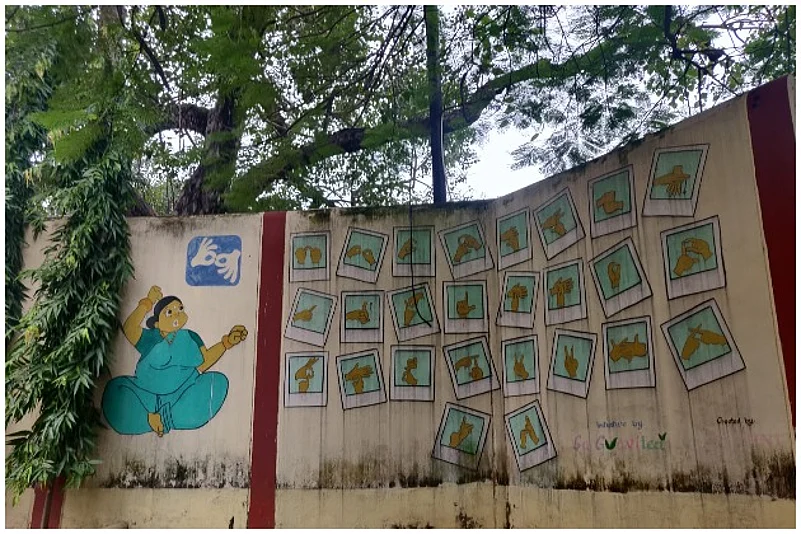
(An ISL wall inside DAV school)
They were rescued and enrolled in the missionary-run Carmel Bal Vidyalay, the only school for deaf children in Jamshedpur. However, due to the pandemic, they have not yet been able to go to school and neither do they have access to laptops or other tools for online education. Priya, a student herself, has been learning from sign language books and teaching the kids, who live in the slums on the edges of Sonari. “They are good at studies but their parents have no interest in sending them to school. That’s because despite going to school, deaf youth often find it difficult to find or keep skilled jobs so parents don’t want to invest in their education.”
Advertisement
Pushpa Maple Lakhra, an ISL teacher who has been teaching deaf and mute children at the Carmel Bal Vidyalaya since 1991, says that though inclusion is the catchword today, not much has changed for children with disabilities when it comes to getting employment-oriented education and skill training. “It all depends on whether they have the resources to get ahead in life. Those with supportive parents who can afford to send them to special schools and invest in their future see results.”
Some of Lakhra’s students now work in clerical positions such as in post offices and banks, in sales as well as computer science. But without education or help from the state or central government schemes and quotas, landing a stable job for deaf persons in the private sector is next to impossible. Only one per cent of government jobs are reserved for persons with hearing disabilities.
Advertisement
Back in La Gravitea, however, the mood is more optimistic. A gentle buzz envelopes the giant bone-China teapot set in the middle of the room like a centrepiece. People pose around it and click pictures with the photobombing “Do not touch' stickers sticking out as fair warnings. Avinash Duggar, who not only runs a tea shop but also collects teapots, swells with pride as he admires his find. “I got it from Cambodia. It is the largest teapot in India. It will be the centrepiece of my teapot museum, a first in the country,” he says.
With the museum, Duggar hopes to further amplify the employment needs and opportunities of the deaf community in Jamshedpur. “Unemployment is a big issue in the country. We want to replicate the model of our cafe where we learn and also teach while providing livelihood to vulnerable communities. And no better way to promote disability empowerment than by letting the PWD themselves take centre stage and show the world in signs what they can’t say in words.”
Advertisement
The yellow-clad workers in the cafe, however, have a joke about the giant teapot. “Boss will ‘blow his lid’ if there’s even a scratch on the teapot,” they sign. A round of giggles momentarily breaks the silence of the cafe.






